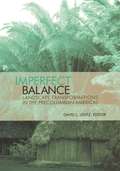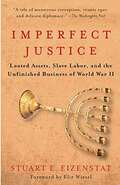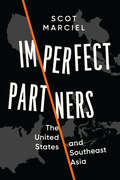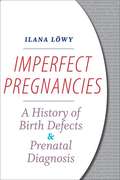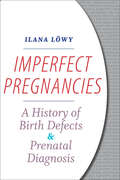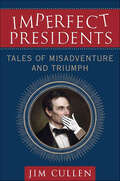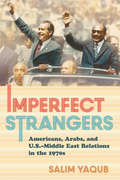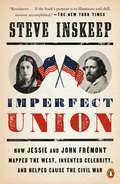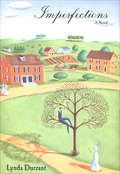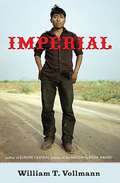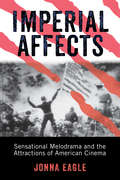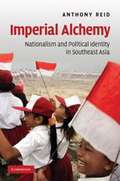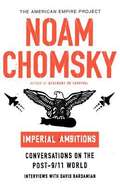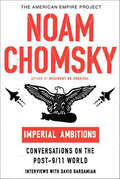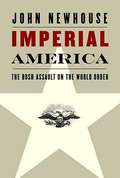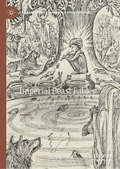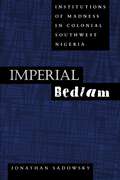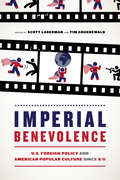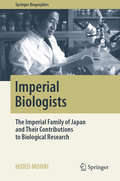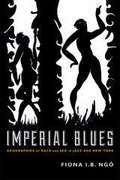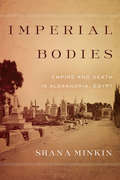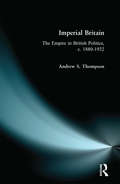- Table View
- List View
Imperfect Balance: Landscape Transformations in the Pre-Columbian Americas
by David L. LentzWe often envision the New World before the arrival of the Europeans as a land of pristine natural beauty and undisturbed environments. However, David Lentz offers an alternative view by detailing the impact of native cultures on these ecosystems prior to their contact with Europeans. Drawing on a wide range of experts from the fields of paleoclimatology, historical ecology, paleontology, botany, geology, conservation science, and resource management, this book unlocks the secret of how the Western Hemisphere's indigenous inhabitants influenced and transformed their natural environment. A rare combination of collaborators uncovers the changes that took place in North America, Mexico, Central America, the Andes, and Amazonia. Each section of the book has been comprehensively arranged so that a botanical description of the natural vegetation of the region is coupled with a set of case studies outlining local human influences. From modifications of vegetation, to changes in soil, wildlife, microclimate, hydrology, and the land surface itself, this collection addresses one of the great issues of our time: the human modification of the earth.
Imperfect Balance: Landscape Transformations in the Pre-Columbian Americas (Historical Ecology Series)
by Ed. David L. LentzWe often envision the New World before the arrival of the Europeans as a land of pristine natural beauty and undisturbed environments. However, David Lentz offers an alternative view by detailing the impact of native cultures on these ecosystems prior to their contact with Europeans. Drawing on a wide range of experts from the fields of paleoclimatology, historical ecology, paleontology, botany, geology, conservation science, and resource management, this book unlocks the secret of how the Western Hemisphere's indigenous inhabitants influenced and transformed their natural environment.A rare combination of collaborators uncovers the changes that took place in North America, Mexico, Central America, the Andes, and Amazonia. Each section of the book has been comprehensively arranged so that a botanical description of the natural vegetation of the region is coupled with a set of case studies outlining local human influences. From modifications of vegetation, to changes in soil, wildlife, microclimate, hydrology, and the land surface itself, this collection addresses one of the great issues of our time: the human modification of the earth.
Imperfect Justice: Looted Assets, Slave Labor, and the Unfinished Business of World War II
by Elie Wiesel Stuart EizenstatImperfect Justice is Stuart Eizenstat's personal account of how the Holocaust became a political and diplomatic battleground fifty years after the war's end, as the issues of dormant bank accounts, slave labor, confiscated property, looted art, and unpaid insurance policies convulsed Europe and America. His story is not one of easy successes or an idyllic view of justice. Rather, it is a revealing chronicle of high-stakes negotiations involving heads of European governments, played out on an international stage in an emotionally charged atmosphere, with a subtext of crimes against humanity and billions of dollars on the table. <p><p>Eizenstat recounts the often heated negotiations with the Swiss, the Germans, the French, the Austrians, and various Jewish organizations, showing how moral and legal issues shunted aside for so long, exposed wounds that had never healed and conflicts that had never been properly resolved. Each country responded in its own way: Switzerland fought the disclosures about its past and deeply resented the outside pressure it faced; Germany accepted that it was once again called upon to account for its wartime sins, this time for those committed by private industry; Austria was torn, seeing itself as both victim and collaborator with Hitler; and France courageously accepted national responsibility for the Vichy regime. And on the other side of the table were a remarkable cast of characters: class-action lawyers, some of whom were altruistic while others were as interested in their own press clippings as in serving the needs of the survivors they represented; Jewish organizations that were at each other's throats over who best represented the victims in their quest for justice; politicians with their own agendas and ambitions, including New York's colorful Senator Alfonse D'Amato, who turned the issue into his own personal crusade; and the President of the United States, Bill Clinton.
Imperfect Partners: The United States and Southeast Asia
by Scot MarcielImperfect Partners is a unique hybrid – part memoir, part foreign policy study of U.S. relations with Southeast Asia, a critically important region that has become the central arena in the global U.S.-China competition. From the People Power revolt in the Philippines to the opening of diplomatic relations with Vietnam, from building a partnership with newly democratic Indonesia to responding to genocide in Myanmar and coups in Thailand, Scot Marciel was present and involved. His direct involvement and deep knowledge of the region, along with his extensive policymaking work in Washington, allows him to bring to life the complexities and realities of key events and U.S. responses, along with rare insights into U.S. foreign policy decisionmaking and the work of American diplomats in the field.
Imperfect Pregnancies: A History of Birth Defects and Prenatal Diagnosis
by Ilana Löwy<p>In the 1960s, thanks to the development of prenatal diagnosis, medicine found a new object of study: the living fetus. At first, prenatal testing was proposed only to women at a high risk of giving birth to an impaired child. But in the following decades, such testing has become routine. <p>In Imperfect Pregnancies, Ilana Löwy argues that the generalization of prenatal diagnosis has radically changed the experience of pregnancy for tens of millions of women worldwide. Although most women are reassured that their future child is developing well, others face a stressful period of waiting for results, uncertain prognosis, and difficult decisions. Löwy follows the rise of biomedical technologies that made prenatal diagnosis possible and investigates the institutional, sociocultural, economic, legal, and political consequences of their widespread diffusion. <p>Because prenatal diagnosis is linked to the contentious issue of selective termination of pregnancy for a fetal anomaly, debates on this topic have largely centered on the rejection of human imperfection and the notion that we are now perched on a slippery slope that will lead to new eugenics. Imperfect Pregnancies tells a more complicated story, emphasizing that there is no single standardized way to scrutinize the fetus, but there are a great number of historically conditioned and situated approaches. This book will interest students, scholars, health professionals, administrators, and activists interested in issues surrounding new medical technologies, screening, risk management, pregnancy, disability, and the history and social politics of women’s bodies.</p>
Imperfect Pregnancies: A History of Birth Defects and Prenatal Diagnosis
by Ilana LöwyHow has prenatal testing, once offered only for high-risk pregnancies, become standard medical care for pregnant women today?In the 1960s, thanks to the development of prenatal diagnosis, medicine found a new object of study: the living fetus. At first, prenatal testing was proposed only to women at a high risk of giving birth to an impaired child. But in the following decades, such testing has become routine. In Imperfect Pregnancies, Ilana Löwy argues that the generalization of prenatal diagnosis has radically changed the experience of pregnancy for tens of millions of women worldwide. Although most women are reassured that their future child is developing well, others face a stressful period of waiting for results, uncertain prognosis, and difficult decisions. Löwy follows the rise of biomedical technologies that made prenatal diagnosis possible and investigates the institutional, sociocultural, economic, legal, and political consequences of their widespread diffusion. Because prenatal diagnosis is linked to the contentious issue of selective termination of pregnancy for a fetal anomaly, debates on this topic have largely centered on the rejection of human imperfection and the notion that we are now perched on a slippery slope that will lead to new eugenics. Imperfect Pregnancies tells a more complicated story, emphasizing that there is no single standardized way to scrutinize the fetus, but there are a great number of historically conditioned and situated approaches. This book will interest students, scholars, health professionals, administrators, and activists interested in issues surrounding new medical technologies, screening, risk management, pregnancy, disability, and the history and social politics of women’s bodies.
Imperfect Presidents: Tales of Misadventure and Triumph
by Jim CullenWhen people make bad decisions, odd remarks, and just plain silly mistakes, the results are sure to haunt them. But when these things happen to the president of the United States, they can change the course of history. In this clever portrait of the American presidency, Jim Cullen takes ten presidents down from their pedestals by examining key missteps in their careers--and how they transcended them. Examples include Abraham Lincoln smearing a preacher and rediscovering his religious vision in emancipating slaves; Lyndon Johnson's electoral fraud in his 1948 Senate race and his role in the signing of the Voting Rights Act; and Ronald Reagan's subversion of the Constitution in the Iran-Contra affair and affirmation of world peace in helping bring about the end of the Cold War. Targeting Republicans and Democrats alike, Cullen's insights are surprisingly timely and hugely entertaining.
Imperfect Strangers: Americans, Arabs, and U.S.–Middle East Relations in the 1970s
by Salim YaqubIn Imperfect Strangers, Salim Yaqub argues that the 1970s were a pivotal decade for U.S.-Arab relations, whether at the upper levels of diplomacy, in street-level interactions, or in the realm of the imagination. In those years, Americans and Arabs came to know each other as never before. With Western Europe's imperial legacy fading in the Middle East, American commerce and investment spread throughout the Arab world. The United States strengthened its strategic ties to some Arab states, even as it drew closer to Israel. Maneuvering Moscow to the sidelines, Washington placed itself at the center of Arab-Israeli diplomacy. Meanwhile, the rise of international terrorism, the Arab oil embargo and related increases in the price of oil, and expanding immigration from the Middle East forced Americans to pay closer attention to the Arab world.Yaqub combines insights from diplomatic, political, cultural, and immigration history to chronicle the activities of a wide array of American and Arab actors—political leaders, diplomats, warriors, activists, scholars, businesspeople, novelists, and others. He shows that growing interdependence raised hopes for a broad political accommodation between the two societies. Yet a series of disruptions in the second half of the decade thwarted such prospects. Arabs recoiled from a U.S.-brokered peace process that fortified Israel’s occupation of Arab land. Americans grew increasingly resentful of Arab oil pressures, attitudes dovetailing with broader anti-Muslim sentiments aroused by the Iranian hostage crisis. At the same time, elements of the U.S. intelligentsia became more respectful of Arab perspectives as a newly assertive Arab American community emerged into political life. These patterns left a contradictory legacy of estrangement and accommodation that continued in later decades and remains with us today.
Imperfect Union: How Jessie and John Frémont Mapped the West, Invented Celebrity, and Helped Cause the Civil War
by Steve InskeepSteve Inskeep tells the riveting story of John and Jessie Frémont, the husband and wife team who in the 1800s were instrumental in the westward expansion of the United States, and thus became America's first great political couple John C. Frémont, one of the United States&’s leading explorers of the nineteenth century, was relatively unknown in 1842, when he commanded the first of his expeditions to the uncharted West. But in only a few years, he was one of the most acclaimed people of the age – known as a wilderness explorer, bestselling writer, gallant army officer, and latter-day conquistador, who in 1846 began the United States&’s takeover of California from Mexico. He was not even 40 years old when Americans began naming mountains and towns after him. He had perfect timing, exploring the West just as it captured the nation&’s attention. But the most important factor in his fame may have been the person who made it all possible: his wife, Jessie Benton Frémont. Jessie, the daughter of a United States senator who was deeply involved in the West, provided her husband with entrée to the highest levels of government and media, and his career reached new heights only a few months after their elopement. During a time when women were allowed to make few choices for themselves, Jessie – who herself aspired to roles in exploration and politics – threw her skill and passion into promoting her husband. She worked to carefully edit and publicize his accounts of his travels, attracted talented young men to his circle, and lashed out at his enemies. She became her husband&’s political adviser, as well as a power player in her own right. In 1856, the famous couple strategized as John became the first-ever presidential nominee of the newly established Republican Party. With rare detail and in consummate style, Steve Inskeep tells the story of a couple whose joint ambitions and talents intertwined with those of the nascent United States itself. Taking advantage of expanding news media, aided by an increasingly literate public, the two linked their names to the three great national movements of the time—westward settlement, women&’s rights, and opposition to slavery. Together, John and Jessie Frémont took parts in events that defined the country and gave rise to a new, more global America. Theirs is a surprisingly modern tale of ambition and fame; they lived in a time of social and technological disruption and divisive politics that foreshadowed our own. In Imperfect Union, as Inskeep navigates these deeply transformative years through Jessie and John&’s own union, he reveals how the Frémonts&’ adventures amount to nothing less than a tour of the early American soul.
Imperfections: A Novel
by Lynda DurrantAs the Civil War looms, a teenager finds refuge from her abusive father in a Shaker community in this &“lovely and thought-provoking&” novel (Kirkus Reviews). Rosemary Elizabeth likes Pleasant Hill. Unlike her former home, the Kentucky Shaker community is serene and full of beautiful things. The food is plentiful and delicious, and she dresses in spotless white garments. Above all, she and her younger siblings are now safe from their drunken, often violent, father, and from the war between the Union and the Confederacy, which is said to be drawing closer every day. Perfection is the goal at Pleasant Hill, and Rosemary Elizabeth vows to be perfect so she&’ll be allowed to stay. As time passes, however, she finds herself more and more at odds with the Shaker path, the rules that are supposed to govern everything she says and does and even what she dreams. If she eliminates all the imperfections the Shakers find in her, will anything remain? &“Built around a historical incident—a visit by the soldiers of Morgan&’s Raiders to Pleasant Hill in 1862—this fine coming-of-age novel rewards readers with an unusual glimpse into a rarely portrayed religion as well as a different perspective on the Civil War.&” —Booklist
Imperial
by William T. VollmannFrom the author of Europe Central, a journalistic tour de force along the Mexican-American border. For generations of migrant workers, Imperial Country has held the promise of paradise and the reality of hell. It sprawls across a stirring accidental sea, across the deserts, date groves and labor camps of Southeastern California, right across the border into Mexico. In this eye-opening book, William T. Vollmann takes us deep into the heart of this haunted region, exploring polluted rivers and guarded factories and talking with everyone from Mexican migrant workers to border patrolmen. Teeming with patterns, facts, stories, people and hope, this is an epic study of an emblematic region.
Imperial Affects: Sensational Melodrama and the Attractions of American Cinema
by Jonna EagleImperial Affects is the first sustained account of American action-based cinema as melodrama. From the earliest war films through the Hollywood Western and the late-century action cinema, imperialist violence and mobility have been produced as sites of both visceral pleasure and moral virtue. Suffering and omnipotence operate as twinned affects in this context, inviting identification with an American national subject constituted as both victimized and invincible—a powerful and persistent conjunction traced here across a century of cinema.
Imperial Alchemy
by Anthony ReidThe mid-twentieth century marked one of the greatest watersheds of Asian history, when a range of imperial constructs were declared to be nation-states, either by revolution or decolonisation. Nationalism was the great alchemist, turning the base metal of empire into the gold of nations. To achieve such a transformation from the immense diversity of these Asian empires required a different set of forces from those that Europeans had needed in their transitions from multi-ethnic empires to culturally homogeneous nations. In this book Anthony Reid explores the mysterious alchemy by which new political identities have been formed. Taking Southeast Asia as his example, Reid tests contemporary theory about the relation between modernity, nationalism, and ethnic identity. Grappling with concepts emanating from a very different European experience of nationalism, Reid develops his own typology to better fit the formation of political identities such as the Indonesian, Malay, Chinese, Acehnese, Batak and Kadazan.
Imperial Ambition in the Early Modern Mediterranean
by Céline DauverdThis book examines the alliance between the Spanish Crown and Genoese merchant bankers in southern Italy throughout the early modern era, when Spain and Genoa developed a symbiotic economic relationship, undergirded by a cultural and spiritual alliance. Analyzing early modern imperialism, migration, and trade, this book shows that the spiritual entente between the two nations was mainly informed by the religious division of the Mediterranean Sea. The Turkish threat in the Mediterranean reinforced the commitment of both the Spanish Crown and the Genoese merchants to Christianity. Spain's imperial strategy was reinforced by its willingness to acculturate to southern Italy through organized beneficence, representation at civic ceremonies, and spiritual guidance during religious holidays.
Imperial Ambitions: Conversations on the Post-9/11 World
by Noam Chomsky David Barsamian[From the book cover] Timely, illuminating, and urgently needed, this volume of interviews conducted by award-winning radio journalist David Barsamian features Noam Chomsky discussing U.S. policies in the increasingly unstable post-9/11 world. In these exchanges, appearing for the first time in print, Chomsky offers his frank, provocative, and informed views on the invasion and occupation of Iraq, the doctrine of preemptive strikes against so-called rogue states, and the growing threat to international peace posed by the U.S. drive for domination. In his inimitable style, Chomsky also dissects the propaganda system that fabricates a mythic past and airbrushes inconvenient facts out of history.
Imperial Ambitions: Conversations on the Post-9/11 World (The American Empire Project)
by Noam ChomskyIn this first collection of interviews since the bestselling 9-11, our foremost intellectual activist examines crucial new questions of U.S. foreign policyTimely, urgent, and powerfully elucidating, this important volume of previously unpublished interviews conducted by award-winning radio journalist David Barsamian features Noam Chomsky discussing America's policies in an increasingly unstable world. With his famous insight, lucidity, and redoubtable grasp of history, Chomsky offers his views on the invasion and occupation of Iraq, the doctrine of "preemptive" strikes against so-called rogue states, and the prospects of the second Bush administration, warning of the growing threat to international peace posed by the U.S. drive for domination. In his inimitable style, Chomsky also dissects the propaganda system that fabricates a mythic past and airbrushes inconvenient facts out of history.Barsamian, recipient of the ACLU's Upton Sinclair Award for independent journalism, has conducted more interviews and radio broadcasts with Chomsky than has any other journalist. Enriched by their unique rapport, Imperial Ambitions explores topics Chomsky has never before discussed, among them the 2004 presidential campaign and election, the future of Social Security, and the increasing threat, including devastating weather patterns, of global warming. The result is an illuminating dialogue with one of the leading thinkers of our time—and a startling picture of the turbulent times in which we live.
Imperial America: The Bush Assault on the World Order
by John NewhouseIn the aftermath of September 11, 2001, most of the world was ready to accept American leadership in a war against terrorism. Yet within a year the United States was estranged from its allies and enmeshed in a costly and increasingly deadly occupation of Iraq, while virtually ignoring potentially great threats from other parts of the world. In this measured but forcefully argued book, the distinguished foreign correspondent John Newhouse shows what went wrong. Timely, knowledgeable, and filled with vivid portraits of such figures as George W. Bush, Tony Blair, Donald Rumsfeld, and Dick Cheney, Imperial America is an indispensable book.
Imperial Beast Fables: Animals, Cosmopolitanism, and the British Empire (Palgrave Studies in Animals and Literature)
by Kaori NagaiThis book coins the term ‘imperial beast fable’ to explore modern forms of human-animal relationships and their origins in the British Empire. Taking as a starting point the long nineteenth-century fascination with non-European beast fables, it examines literary reworkings of these fables, such as Rudyard Kipling’s Jungle Books, in relation to the global politics of race, language, and species. The imperial beast fable figures variably as a key site where the nature and origins of mankind are hotly debated; an emerging space of conservation in which humans enclose animals to manage and control them; a cage in which an animal narrator talks to change its human jailors; and a vision of animal cosmopolitanism, in which a close kinship between humans and other animals is dreamt of. Written at the intersection of animal studies and postcolonial studies, this book proposes that the beast fable embodies the ideologies and values of the British Empire, while also covertly critiquing them. It therefore finds in the beast fable the possibility that the multitudinous animals it gives voice to might challenge the imperial networks which threaten their existence, both in the nineteenth century and today.
Imperial Bedlam: Institutions of Madness in Colonial Southwest Nigeria (Medicine and Society #10)
by Jonathan SadowskyThe colonial government of southern Nigeria began to use asylums to confine the allegedly insane in 1906. These asylums were administered by the British but confined Africans. Yet, as even many in the government recognized, insanity is a condition that shows cultural variation. Who decided the inmates were insane and how? This sophisticated historical study pursues these questions as it examines fascinating source material—writings by African patients in these institutions and the reports of officials, doctors, and others—to discuss the meaning of madness in Nigeria, the development of colonial psychiatry, and the connections between them. Jonathan Sadowsky's well-argued, concise study provides important new insights into the designation of madness across cultural and political frontiers.Imperial Bedlam follows the development of insane asylums from their origins in the nineteenth century to innovative treatment programs developed by Nigerian physicians during the transition to independence. Special attention is given to the writings of those considered "lunatics," a perspective relatively neglected in previous studies of psychiatric institutions in Africa and most other parts of the world.Imperial Bedlam shows how contradictions inherent in colonialism were articulated in both asylum policy and psychiatric theory. It argues that the processes of confinement, the labeling of insanity, and the symptoms of those so labeled reflected not only cultural difference but also political divides embedded in the colonial situation. Imperial Bedlam thus emphasizes not only the cultural background to madness but also its political and experiential dimensions.
Imperial Benevolence: U.S. Foreign Policy and American Popular Culture since 9/11
by Scott LadermanThis is a necessary and urgent read for anyone concerned about the United States' endless wars. Investigating multiple genres of popular culture alongside contemporary U.S. foreign policy and political economy, Imperial Benevolence shows that American popular culture continuously suppresses awareness of U.S. imperialism while assuming American exceptionalism and innocence. This is despite the fact that it is rarely a product of the state. Expertly coordinated essays by prominent historians and media scholars address the ways that movies and television series such as Zero Dark Thirty, The Avengers, and even The Walking Dead, as well as video games such as Call of Duty: Black Ops, have largely presented the United States as a global force for good. Popular culture, with few exceptions, has depicted the U.S. as a reluctant hegemon fiercely defending human rights and protecting or expanding democracy from the barbarians determined to destroy it.
Imperial Biologists: The Imperial Family of Japan and Their Contributions to Biological Research (Springer Biographies)
by Hideo MohriThis book sheds light on a little-known aspect of the Imperial family of Japan: For three generations, members of the family have devoted themselves to biological research. Emperor Showa (Hirohito) was an expert on hydrozoans and slime molds. His son, Emperor Akihito, is an ichthyologist specializing in gobioid fishes, and his research is highly respected in the field. Prince Akishino, Emperor Akihito’s son, is known for his research on giant catfish and the domestication of fowl, while Prince Hitachi, Emperor Akihito’s brother, has conducted research on cancer in animals.The book shows how they became interested in biology, how seriously they were committed to their research, what their main scientific contributions are, and how their achievements are valued by experts at home and abroad.To commemorate the 60-year reign of Emperor Showa and his longtime devotion to biology, the International Prize for Biology was founded in 1985. The prize seeks to recognize and encourage researches in basic biology. A list of winners and a summary of their research are presented in the last part of the book.The author, an eminent biologist who has given lectures to the Imperial Family, explains their research and tells the fascinating story of biology and the Imperial Family of Japan. The book is a valuable resource, not only for biology students and researchers, but also for historians and anyone interested in science and the Royal and Imperial families.
Imperial Blues: Geographies of Race and Sex in Jazz Age New York
by Fiona I. NgôIn this pathbreaking study, Fiona I. B. Ngô examines how geographies of U.S. empire were perceived and enacted during the 1920s and 1930s. Focusing on New York during the height of the Harlem Renaissance, Ngô traces the city's multiple circuits of jazz music and culture. In considering this cosmopolitan milieu, where immigrants from the Philippines, Cuba, Puerto Rico, Mexico, Japan, and China crossed paths with blacks and white "slummers" in dancehalls and speakeasies, she investigates imperialism's profound impact on racial, gendered, and sexual formations. As nightclubs overflowed with the sights and sounds of distant continents, tropical islands, and exotic bodies, tropes of empire provided both artistic possibilities and policing rationales. These renderings naturalized empire and justified expansion, while establishing transnational modes of social control within and outside the imperial city. Ultimately, Ngô argues that domestic structures of race and sex during the 1920s and 1930s cannot be understood apart from the imperial ambitions of the United States.
Imperial Bodies: Empire and Death in Alexandria, Egypt
by Shana MinkinAt the turn of the twentieth century, Alexandria, Egypt, was a bustling transimperial port city, under nominal Ottoman and unofficial British imperial rule. Thousands of European subjects lived, worked, and died there. And when they died, the machinery of empire had to negotiate for space, resources, and control with the nascent national state. Imperial Bodies shows how the mechanisms of death became a tool for exerting both imperial and national governance. Shana Minkin investigates how French and British power asserted itself in Egypt through local consular claims of belonging manifested within the mundane caring for dead bodies. European communities corralled imperial bodies through the bureaucracies and rituals of death—from hospitals, funerals, and cemeteries to autopsies and death registrations. As they did so, imperial consulates pushed against the workings of both the Egyptian state and each other, expanding their governments' material and performative power. Ultimately, this book reveals how European imperial powers did not so much claim Alexandria as their own, as they maneuvered, manipulated, and cajoled their empires into Egypt.
Imperial Boundaries: Cossack Communities and Empire-building in the Age of Peter the Great
by Brian J. BoeckImperial Boundaries is a study of imperial expansion and local transformation on Russia's Don Steppe frontier during the age of Peter the Great. Brian Boeck connects the rivalry of the Russian and Ottoman empires in the northern Black Sea basin to the social history of the Don Cossacks, who were transformed from an open, democratic, multiethnic, male fraternity dedicated to frontier raiding into a closed, ethnic community devoted to defending and advancing the boundaries of the Russian state. He shows how by promoting border patrol, migration control, bureaucratic regulation of cross-border contacts and deportation of dissidents, Peter I destroyed the world of the old steppe and created a new imperial Cossack order in its place. In examining this transformation, Imperial Boundaries addresses key historical issues of imperial expansion, the delegitimization of non-state violence, the construction of borders, and the encroaching boundaries of state authority in the lives of local communities.
Imperial Britain: The Empire in British Politics, c. 1880-1932
by Andrew S. ThompsonThis new study considers the impact of the empire upon modern British political culture. The economic and cultural legacy of empire have received a great deal of attention, but historians have neglected the effects of empire upon the domestic British political scene. Dr Thompson explores economic, demographic, intellectual and military influences and he shows how parliamentary and party opinion interacted with imperial ideas and interests in the country at large. This is a major new book which explores the ideology of key imperial campaigns, and their popular support. It makes a critical contribution to recent debates -- about the importance of empire to the nature and development of British national identities before and after the First World War.
